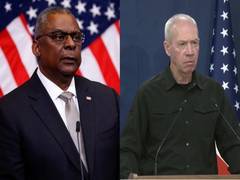Imran Khan urges Pak’s top judge to intervene to safeguard rule of law and Constitution
Islamabad, Apr 22 (PTI) Pakistan’s jailed former prime minister Imran Khan has urged Chief Justice Qazi Faez Isa to intervene to safeguard the rule of law and supremacy of the Constitution in the country as he highlighted multiple issues including alleged rigging during the February 8 general elections.
Khan, 71, in a letter dated April 20 highlighted seven key issues faced by the country, including the anti-corruption watchdog giving a clean chit to former premier Nawaz Sharif in the Toshakhana case and alleged rigging in the February general elections.
Khan reminded the chief justice that the entire nation was looking at him and quoted the words of one of the greatest and most influential scientists of all time, Albert Einstein: “The world is a dangerous place, not because of those who do evil, but because of those who look on and do nothing.”
He stated that the rule of law and supremacy of the Constitution has fallen to a new low in Pakistan under his watch, saying it has caused the gradual emergence of the “law of the jungle and the enactment of the primitive doctrine that might is right.”
“I have no doubt that if our superior judiciary, with your good self at its helm, would not meaningfully intervene as the custodian of the Constitution and the ultimate arbiter of justice, and if the foregoing situation were to prevail,” Khan said, adding that “it would be fatal to any civilized order in the world.”
Among the seven issues, Khan urged the chief justice to take notice of the National Accountability Bureau’s sudden decision to exonerate former premier Nawaz Sharif, saying the case was pursued for years and has now been dropped. Also, Khan called for an inquiry against NAB Chairman Nazir Ahmed Butt and sought his removal from office.
Secondly, he urged the top judge to look into the Bahawalnagar incident, involving the alleged thrashing of police by army soldiers, saying it should serve as an eye opener on the lop-sided state of uniformed vigilante justice in Pakistan.
Secondly, he urged the top judge to look into the Bahawalnagar incident, involving the alleged thrashing of police by army soldiers, saying it should serve as an eye opener on the lop-sided state of uniformed vigilante justice in Pakistan.
Thirdly, Khan asked for action on the letter written by six judges of the Islamabad High Court, complaining about being subjected to blackmail, harassment and coercion by “members of the executive, including operatives of intelligence agencies.”
Fourthly, he stated that 90 per cent of the people incarcerated and facing trial in connection with the May 9 incidents “did not indulge in any violence whatsoever”. The state, however, is acting as judge, jury, and executioner in all these trials, he said.
Khan said a constitutional petition on the issue has been pending in the Supreme Court since May 25, 2023, and urged that “this case must be fixed and decided upon on a priority basis.”
Khan also referred to a press conference of the Commissioner Rawalpindi Division on February 17, 2024, regarding the alleged manipulation of election results on February 8, urging the top judge to look into the commissioner’s subsequent retraction.
He asked the chief justice to look into a series of petitions, including one filed by his party, pressing that, contrary to constitutional stipulations, the general election of February 8, 2024, was “not conducted honestly, justly, fairly and under law, and that corrupt practices were not guarded against therein”.
Lastly, he urged the chief judge to look into the issue of allocation of reserved seats in the national and provincial assemblies, urging that the pending petitions on this subject must also be fixed.
Khan during his tenure had tried to remove Justice Isa from his post as judge of the Supreme Court, and surprisingly he referred to the issue by stating that the chief justice had faced the wrath of the state in the form of a reference against him and urged him to take action to save “majority of populace” from the “wrath of the state”.








